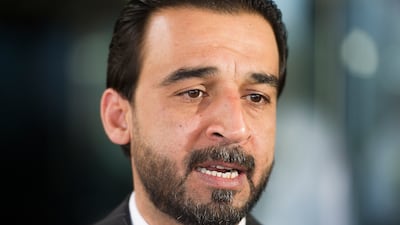Iraq's ousted Parliament Speaker Mohammed Al Halbousi said on Wednesday that the ruling by the country's top court to dismiss him over forgery charges is unconstitutional, setting the stage for a possible political crisis.
Mr Al Halbousi has been in a months-long legal battle with Sunni legislator Laith Al Dulaimi, who accused him of forging his signature on a resignation letter.
The Supreme Federal Court ruled on Tuesday to revoke his parliamentary membership and to end his tenure as Parliament Speaker. It also removed Mr Al Dulaimi as an MP.
In a press conference, Mr Al Halbousi argued that the parliamentary membership and termination are governed by specific constitutional articles, laws and procedures inside the parliament which are beyond the Supreme Federal Court's jurisdiction.
The court, he said, determines the constitutionality of laws and regulations, and settles disputes between the federal government, regions and provinces.
It also settles accusations directed against the president, prime minister and ministers not the parliament speaker, he added.
"The court has no right to look into the legitimacy of the membership of the lawmaker," he said.
He said that parliamentary membership can be terminated only when the legislator resigns or dies and in the event of a disease, a prison sentence for a crime, links to outlawed Saddam Hussein's Baath Party, hiding real age, assuming official post and not attending the sessions.
The constitution stipulates that the termination of parliamentary membership needs at least a two-thirds vote in the parliament, he added.
“The Federal Court didn’t adhere to these conditions and the termination didn’t rely on any of these reasons," he said.
"The ruling has nothing to do with the constitution," he added, without clarifying if he will leave his post or not.
Prime Minister Mohammed Shia Al Sudani met Mr Al Halbousi on Wednesday and discussed the "latest political developments and ways to sustain political stability", according to a statement.
Mr Al Sudani "stressed the importance of resorting to dialogue and resolving all emerging issues through discussions among the political forces" it added.
Both statements from the prime minister's and the parliament speaker's offices retained the official title of Mr Al Halbousi.
Shortly after Tuesday's ruling, the powerful young Sunni politician said he was surprised by the court's decision. He said he would seek clarification on the ruling.
Sunni-Sunni strife
Since late Tuesday, prominent Sunni political parties have held meetings to choose a replacement for Mr Al Halbousi, legislators told The National on Wednesday.
His rivals, Al Hal Party and Azim Alliance, as well as his ally, the Siyyada Party, did not criticise the ruling.
“Al Hal Party welcomes the Federal Court ruling,” the party, which is led by Jamal Al Karbouli, said in a statement late on Tuesday.
“The decision affirms that the judiciary is the safety valve in Iraq and the fundamental pillar relied upon to correct the deviations of officials from their duties as stipulated by the constitution and law,” it added
It described the ruling as “the first step in correcting the course, setting limits on violations and preventing the abuse of power”.
Azim Alliance, which is led by Muthana Al Samaraie, considered the decision “a significant step towards reinforcing the principle of the constitutional statehood in Iraq, ensuring everyone's equal before law”.
“We call on everyone to respect and implement these decisions,” the statement added, emphasising the “necessity of continuing the political process in Iraq and achieving both security and political stability”.
For its part, tycoon Khamis Al Khanjar’s Siyyada Pary said it “respects the Iraqi judiciary decisions” and called for an “urgent meeting to discuss the next step”.
Since late Tuesday, these major parties have been trying to pick a nominee to replace Mr Al Halbousi, two Sunni legislators confirmed.
Three names are on the table, they said. These are Ziyad Al Janabi and Haybat Al Halbousi, linked to Mr Al Halbousi’s Taqadum Party, and Salim Al Essawi, who is with the Siyyada Party, they added.
Shortly after the ruling, the Taqadum Party called it a “flagrant violation to the constitution and clear political targeting”.
The party's ministers of planning, industry and culture will submit their resignation as will the MPs who sit on parliamentary committees, the statement added. The MPs will also boycott parliamentary sessions.
In addition, the party will boycott political meetings with other parties, it said.
As of Wednesday, no minister has submitted his resignation letter, according to Hisham Al Rikabi, adviser to the prime minister.
The ministers are Deputy Prime Minister and Minister of Planning Mohammed Tamim, Minister of Industry and Minerals Kahlid Battal Najam and Minister of Culture Ahmed Al Badrani.
Mr Al Halbousi, a former governor of Anbar province, was elected as the country's parliament speaker for a second term in January 2022.
He established the Progress Party, or Taqadum in Arabic, which won the majority of Sunni votes in the October 2021 national elections, taking 37 seats in the 329-seat legislative body.
Mr Al Halbousi’s removal is unlikely to have repercussions on the country’s political process, Hadi Jalo Marie, chairman of the Political Decision think tank in Baghdad, told The National.
“It is an internal Sunni-Sunni strife so the impacts will be limited,” Mr Marie said. “I don’t think his removal from parliament, or the political process, will lead to a big problem in the country,” he added.
“Other Sunni political parties are allies and the majority of them welcomed the decision so for sure they will agree on a new nominee for the post,” he said.
The immediate effect, he said, will be on Taqadum, which “is built on the symbolism of Al Halbousi and that it could be disintegrated and we could see some of its nominees join other Sunni parties”.


